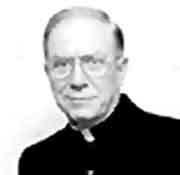 | Father Richard James Cleary was born and reared in Wichita. After graduation from Cathedral High School in 1947, he attended the seminary operated by the Benedictine monks of Conception Abbey in Northwestern Missouri. There he came to appreciate the life of the monks and, having obtained the permission of Bishop Mark Carroll of Wichita, he became a monk of that monastery. After being ordained a priest in 1955, his superiors sent him to get his master’s degree at the University of Ottawa, Canada, then to study in Athens, Greece, and then in Rome, Italy, where he obtained his doctor’s degree in Theology. Finally, he spent a year of study at Harvard University. Later, Fr. Cleary was assigned to teach for many years in Rome. In 1998, he returned to Wichita, where he served in parish ministry at St. Mary’s Cathedral and at Blessed Sacrament parishes. In 2001, his abbot (superior) transferred him to Arkansas, where he served as chaplain of the Benedictine Sisters of Holy Angels Convent in Jonesboro, and helped in the parishes of northeast Arkansas. In March 2010, he was re-assigned to his monastery, Conception Abbey, Conception, in Missouri 64433. He can be contacted there at, 660-944-2877, or by email: rjcleary@juno.com. |
Religion
2011-10-20 10:45:28
Deism
A: Deists believe in God, or at least a divine principle, but follow few…if any…of the other beliefs and practices of Christianity and Judaism. We distinguish Deists from Theists, who believe in a personal God. Developed in the 17th and 18th centuries, Deism envisions God as a kind of clock-maker, who created the universe and set it in motion, but then allows it to run on its own, without further concern. Thereby, it denies the Jewish, Christian and Moslem teaching about God’s intervention in human history. Some important Americans of the Revolutionary period, including Benjamin Franklin and Thomas Paine, were Deists, as also were many of the personalities of the French Enlightenment, including Rousseau and Voltaire.
Deism is a kind of theological attitude in-between traditional skepticism and atheism. It does not reflect the beliefs of any specific sect. Rather it is an attitude, almost exclusively confined to intellectuals among the upper classes. These pseudo-philosophers are not interested in religion as such, except to express their contempt for current expressions of Christian tradition and organized religion.
Representing the secularism of their day, they propose a philosophical and ethical substitute for revelation, based on the power of nature and the light of human reason.
Originating in England during the 17th century, which witnessed many wars and conflicts fought in the name of religion, the early Deists attempted to achieve peace by preparing a confession of faith, to which all rational people might subscribe. They sought to discover a minimal creed that would put an end to the controversies, which led to armed conflict and civil war.
The scientific rationalism of the late 17th century (represented by Sir Isaac Newton) encouraged the ideas of the early deists. Their desire for social harmony seemed analogous to the harmony existing in the universe, as explained in Newton’s famous Mathematical Principles. Scientific discoveries also cast doubts on the truth of traditional theology.
Natural reason demands a prime mover, and a moral law with future rewards and punishments. This is the summary of “natural religion;” everything else, including “revelation” was regarded as expendable.
Naturally, there followed disputes between the deists, who wish to “purify” Christianity, and the orthodox, who wished to retain as much of revelation as possible. The deists attacked everything that cannot be proved by the senses, including revelation and miracles. They alleged that traditional religion is based on superstition and has contributed little to the moral improvement of mankind. In Protestant countries, the deists strove to reduce religion to an ethical code, and to transform the established Church into a quasi department of morality within the government. The Deist movement lost momentum towards the end of the 18th century, thanks to the rise of the Methodists and Evangelicals, both of which offered a more enthusiastic religion than that afforded by the rational deists. They were so successful that they inspired the Christian revival of the 19th century.
In France, deism influenced the French revolution. Voltaire hoped that natural religion would shape better citizens. He used rationalism to attack the Roman Catholic Church, practiced by a majority of French people.
Rationalism reached its zenith in 1793, at the height of the “reign of terror” in Paris, when the cathedral of Notre Dame was proclaimed a “temple of reason” and a naked prostitute was enthroned on the altar as “the goddess of reason.” This nonsense was overthrown when it’s promoter, Robespierre, had his head severed from his shoulders by the guillotine. The French deists were proclaimed a danger to society.
In Germany, deism became fashionable among some of the upper classes after 1750; but there, as elsewhere in Europe, a spiritual re-awakening, generally called “the Romantic Movement,” checked the spread of philosophical deism.
Nevertheless, deism established an ideal of toleration and liberty, which all right-thinking peoples can endorse. It promoted an improvement in public morality. Although it rejected divine revelation, it emphasized the value of scholarship as an aid to a more pure religion. As a direct consequence, there followed in the 19th century the monumental biblical studies, and then the beginnings of the liturgical renewal. The deists’ attempts to reconcile religion and science, along with other intellectual currents, set a precedent for major developments.


